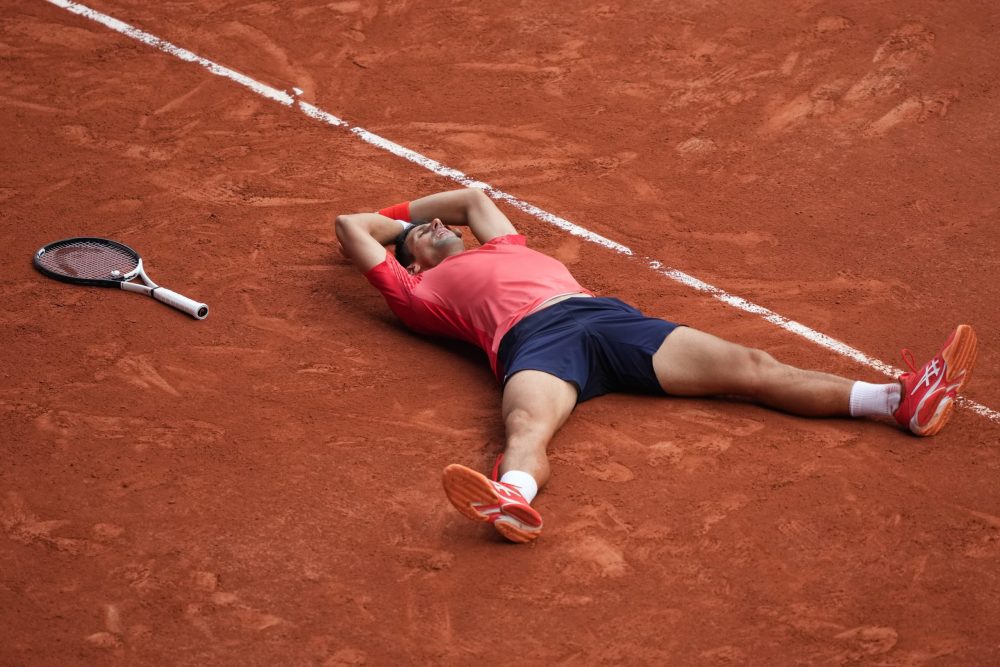Focused, transformed and the ultra-pro era
In 2009, playing to the point of exhaustion (97 matches!), he lost four Masters 1000 finals (Miami, Monte-Carlo, Rome, Cincinnati) before winning in Bercy, still suffering from the three missed match points against Nadal in a legendary four-hour battle in Madrid. The following year, in the quarter-finals of the French Open, he won the first two sets against Jürgen Melzer before collapsing in the next three. A memorable failure. ‘A horrible moment and a turning point in his life,‘ he says. Being in tears in the locker room, he wondered if this mission from hell made sense. ‘The worst time,’ recalls Marian Vajda, his long-time coach, who played such an important role in this saga. Novak wanted to progress so quickly that it was no longer realistic.
The Serb then decided, at the age of 23, to be as perfect as possible, both in managing his emotions and in controlling his body. After mastering all the angles of the field and the concept of elasticity, he expanded his areas of expertise to mindfulness and nutrition, without hesitating to reach out to a wider circle of people, not all of whom came with referrals. The pro he was at the age of 6 became the ultra-pro. Djocosmism is launched. He frees himself from his family, he quotes Plato on altruism, he surrounds himself with trees to get energy, he takes constant urine samples to make sure he is sufficiently hydrated. And when he does indulge in a chocolate square, he does so only after beating Nadal in a six-hour battle in Melbourne.
It is hard to imagine the sacrifices made on a daily basis for this continued dedication to the cause. The symbol of this metamorphosis is the gluten-free diet, introduced in the summer of 2010 by a strange white-goateed gentleman living in Cyprus, a nutritionist, psychiatrist and acupuncturist: the mysterious Igor Cetojevic, who soon disappeared from the clan. For Cetojevic, the four white poisons (sugar, salt, flour and fat) must be countered with a holistic approach aimed at harmonising the body’s physical, mental, emotional and spiritual forces. Cetojevic placed slices of bread on Djokovic’s stomach and felt the resistance of his arms to remove them, so as to become convinced that anything that propagates this weakness must be eliminated. The Serb, who will lose four kilos, undoubtedly gaining in explosiveness what he could have lost in stroke power, reveals to everyone his determination: he will leave no stone unturned to succeed in his mission.
Later, he would surprise people with his friendship with Pepe Imaz, a former Spanish professional and follower of the ‘Love and Peace’ doctrine, with his desire to explore a way of being on court with controlled emotionality, even if it meant referring to telepathy. He delves so deep into this esoteric world that he starts claiming that emotions can purify polluted water. More prosaically, he even incorporates these ideas and conscious breathing while cycling in a London park with his brothers during Wimbledon (‘our Avatar adventure in connection with nature’, he said). In short, all the tools of mental preparation, applied daily, to grow in his holistic and unique approach.
The art of it all lies in finding balance through a path plagued with several questions. How to avoid making victory, which is essential, the only measuring tool for bringing joy? How to burn from within and spread waves of well-being amidst increasing pressure? Djokovic is a wise man seething from within. Sparks guaranteed. Things started to ignite in December 2010, when Serbia, led by ‘Nole 1’, defeated France in the Davis Cup final, claiming a liberating victory. “When he took the court on Friday against Monfils, he looked like a Roman emperor. Majestic,” said French coach Lionel Roux.
CONTINUED ON PAGE 5: Becoming a formidable force






